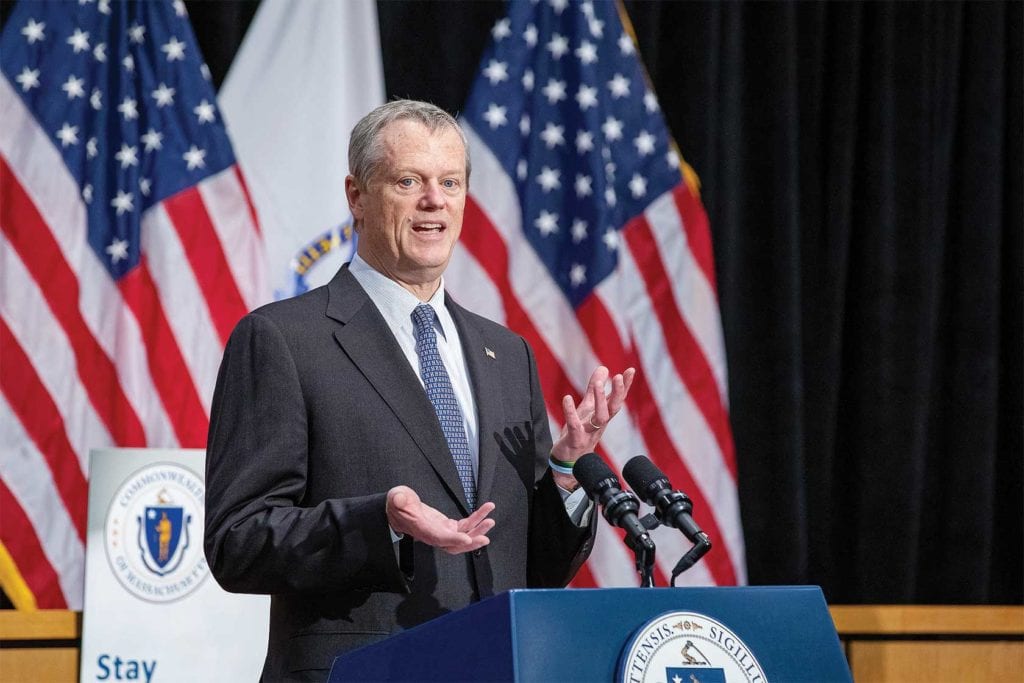
Factories and construction sites will begin the process of reopening this week under a four-phase plan Gov. Charlie Baker released May 18.
By next week, offices outside of Boston will reopen under the gradual process Baker outlined in a press conference Monday that will end with what he called the “new normal.” The guidelines call for places of public accommodation to operate with reduced capacity while public health experts monitor the spread of the coronavirus through contact tracing.
“As we start the phase return to our new normal, we are going to ask people once again to rise to the occasion as we continue to fight this virus,” Baker said. “Our collective success depends on everyone.”
Each of the four phases of reopening will last at least three weeks but may last longer depending on public health outcomes. Certain sectors will only reopen if public health data indicates it’s appropriate to do so, said Baker. If the data indicates otherwise, shutdowns could come back.
Mayor Martin Walsh emphasized the importance of reopening safely.
“The framework released today can serve as a guide for a cautious, phased-in approach to reopening the economy,” he said in a statement on Monday, “driven by clear public health criteria and safety guidelines that will keep our residents and workers healthy, and the Commonwealth moving in the right direction.”
Businesses must comply with new requirements before reopening. The reopening board’s report also details industry-specific protocols for meeting safety standards.
“Businesses operating to provide essential services will have until May 25 to comply with these mandatory safety standards,” said Lt. Gov. Karyn Polito, who co-chaired the reopening board. “Businesses newly opening in phase one must comply with these standards before they open.”
Polito said that businesses must also develop a “COVID-19 Control Plan” and prepare their workplace for handling the pandemic.
“These workplace safety standards will be jointly enforced by local boards of health, the department of public health and the department of labor standards,” she said.
Multiple industries are beginning the reopening process. Places of worship were cleared to reopen on Monday, provided they operate at no more than 40 percent of capacity. On May 25, retail establishments can offer curbside service. Barbershops and hair salons are also reopening on that date. In a week, office buildings outside of Boston can reopen at 25% capacity. In Boston, however, office employees can’t resume work until June 1.
Although construction is reopening across the commonwealth, Boston is reopening construction in phases. Work on schools, hospitals, open-air construction and residential work is allowed until May 25. After that, the Walsh administration will permit any construction type allowed by the state.
Health care facilities across the state are also resuming “high priority” care for certain patients.
Reopening is dependent on employees’ ability to comply with health requirements.
“This guidance asks people to change behaviors, and it changes the way some of our favorite places look and feel,” said Baker.
He also emphasized the importance of each resident following social distancing guidelines. The state has officially shifted from a “stay at home” mandate to a “safer at home” advisory, which instructs everyone to stay at home unless they’re headed to a newly opened facility or activity. Seniors and people with underlying medical issues are still encouraged to stay home.
The face-mask mandate is also still in place. People are required to wear face coverings if they aren’t at least six feet from others, and large gatherings are prohibited.
“This effort will hinge, fundamentally, on personal responsibility,” said Baker.
Most places can’t reopen during phase one. Campgrounds, playgrounds, community pools, athletic fields and youth sports are all set to resume in phase two. Phase two will also include increased health care services. Phase three will likely include entertainment and art industries, gyms and bars, museums and casinos, and a fully serviced MBTA. The final phase, or the “new normal,” somewhat relies on the development of a COVID-19 vaccine.
There have already been over 87,000 cases of COVID-19 in Massachusetts as of Monday, and over a million residents have filed for unemployment pay. Baker acknowledged the “horrific toll” that COVID-19 has taken on the commonwealth.
“The toll this virus takes and continues to take on many of us is staggering,” he said. “But the response, the fight, the millions of people who are doing what they have to do to push back, has been brave and bigger.”
Baker said that people have managed to “flatten the curve.” Hospitalizations are lower than they have been in months. Nevertheless, over 5,800 Massachusetts residents have died since the start of the pandemic.
“Everyone who lost a friend, a brother, a sister, a mom or a dad, there are tens of thousands of you right here in the commonwealth who have either grieved or going through one of the hardest moments of your life,” he said, and commended the stories of residents rising to the occasion and overcoming unprecedented times.
The governor also noted that vigilance is required to avoid a second wave of the pandemic. Health experts have warned that the virus may peak again in the fall.
“We cannot move forward unless we commit to continuing to slow the spread,” he said.






